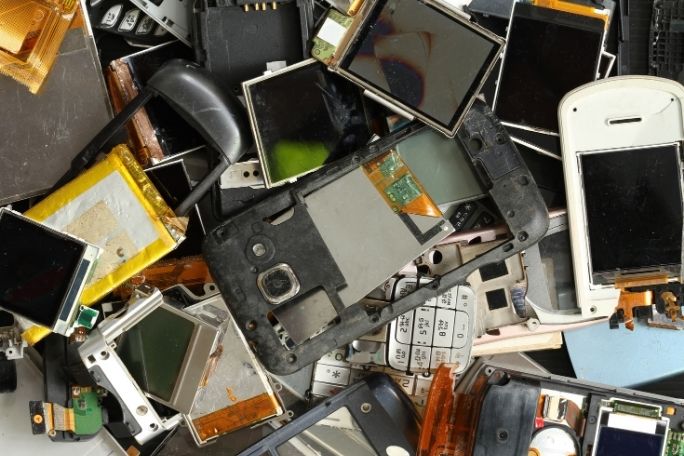Lesson summary
In this lesson, students will learn about the importance of recycling electronic devices, including mobile phones. They will draw on new knowledge and understandings to develop a persuasive writing piece encouraging others to consider their choices when disposing of electronics. Students will develop skills in selecting specific persuasive techniques to enhance the impact of their writing. This lesson is designed to provide valuable practise for NAPLAN, the national literacy and numeracy test held in Years 3, 5, 7 and 9*.
Learning intentions:
Students will...
- understand the importance of recycling electronics to reduce environmental impact
- use a range of language techniques to increase the impact of their persuasive texts
Success criteria:
Students can...
- identify electronics items that are able to be recycled
- explain the impact of not recycling electronic products
- recall the language techniques: personal language, emotive language, modality, mood, rhetorical questions, evaluative language and intensifiers
- include language techniques in their written persuasive texts in a manner that enhances the impact of their argument
Lesson guides and printables
Lesson details
Curriculum mapping
Australian Curriculum content descriptions:
Year 7 English:
- Plan, draft and publish imaginative, informative and persuasive texts, selecting aspects of subject matter and particular language, visual, and audio features to convey information and ideas (ACELY1725)
- Edit for meaning by removing repetition, refining ideas, reordering sentences and adding or substituting words for impact (ACELY1726)
Year 8 English:
- Experiment with particular language features drawn from different types of texts, including combinations of language and visual choices to create new texts (ACELT1768)
- Create imaginative, informative and persuasive texts that raise issues, report events and advance opinions, using deliberate language and textual choices, and including digital elements as appropriate (ACELY1736)
- Experiment with text structures and language features to refine and clarify ideas to improve the effectiveness of students’ own texts (ACELY1810)
Syllabus outcomes: EN4-4B, EN4-2A.
General capabilities: Literacy, Ethical Understanding, Critical and Creative Thinking
Cross-curriculum priority: Sustainability OI.3
Relevant parts of Year 7 achievement standards: By the end of Year 7, students understand how text structures can influence the complexity of a text and are dependent on audience, purpose and context. They demonstrate understanding of how the choice of language features, images and vocabulary affects meaning. Students understand how the selection of a variety of language features can influence an audience. They understand how to draw on personal knowledge, textual analysis and other sources to express or challenge a point of view. They create texts showing how language features and images from other texts can be combined for effect.
Relevant parts of the Year 8 achievement standards: By the end of Year 8, students understand how the selection of text structures is influenced by the selection of language mode and how this varies for different purposes and audiences. Students explain how language features, images and vocabulary are used to represent different ideas and issues in texts. Students understand how the selection of language features can be used for particular purposes and effects. They explain the effectiveness of language choices they make to influence the audience. Through combining ideas, images and language features from other texts, students show how ideas can be expressed in new ways.
Unit of work: National Recycling Week – Years 7 & 8
Time required: 90 mins
Level of teacher scaffolding: Medium – Students who have difficulty completing writing tasks of Year 7 and 8 standard may require support
Resources required
- Student worksheets – one per student (printed)
- Electronics Recycling Factsheet – one per student (printed)
- Persuasive Language Factsheet – one per student (printed)
- Editing Checklist – one per student (printed)
- A4 paper for each student
- Projector with sound to view video
If possible, use recycled paper to print worksheets on and save any discarded paper to reuse in other classroom activities
Skills
This lesson is designed to build students’ competencies in the following skills:
- Communication
- Community engagement
- Creativity
- Ethical understanding
Additional info
This lesson has been developed as part of Planet Ark’s National Recycling Week. Following this lesson plan is an ideal way for your school to take part in MobileMuster. You’ll be joining thousands of amazing teachers in making a difference and creating positive environmental change. Take part in the Schools Recycling Right Challenge for Planet Ark’s National Recycling Week. Register your lesson or other activities today!


Welcome back!
Don't have an account yet?
Log in with:
By signing up to Cool.org you consent and agree to Cool's privacy policy to
store, manage and process your personal information. To read more, please see
our privacy policy here(Opens in new tab).
Create your free Cool.org account.
Many of our resources are free, with an option to upgrade to Cool+ for premium content.
Already have an account?
Sign up with:
By signing up to Cool.org you consent and agree to Cool's privacy policy to
store, manage and process your personal information. To read more, please see
our privacy policy here(Opens in new tab).